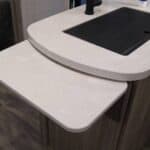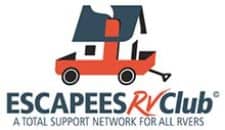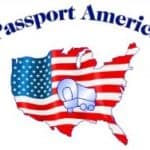Selling the house and hitting the road? Saying goodbye to your friend is hard enough … will you also have to bid adieu to your charming local bank?
If you’re a full-time, part-time, or seasonal RV traveler, this post is for you. Let’s walk through options for mobile banking and cash handling when you live on the road!
Where Can You Bank On the Road?
Local Banks
There’s no law that says you can’t use your favorite local bank or credit union while traveling full-time in an RV.
Conventional wisdom says you should switch to a nationwide bank. That’s no longer necessarily true. Many local banks now offer mobile apps and websites that rival the Big Guys. You can go full-time and never know the difference.
However, some local banks still lack the technology (smartphone apps) and nationwide access (ATM networks) for easy banking on the road. Download the app and test it out yourself!
Here are some features I look for in a bank or credit union:
- FDIC insurance
- 24/7 customer service chat or phone number
- Ability to deposit a check remotely using a mobile app
- Checking accounts with no transaction limits
- Allows Electronic Fund Transfers (EFTs)
- No account monthly maintenance fees
- Transfers to external or linked accounts
- Nationwide ATM partnership network
- E-statements (no paper statements in the mail)
- Free credit report checks
- ATM reimbursement
I absolutely will not choose a bank that requires me to deposit a check by mail. I hate fiddling about with snail mail: the stamps, the deposit slips, licking the envelope – and then waiting another two weeks for the check to arrive!
Instead, I always look for a bank or credit union that allows mobile check deposits. Chris Dunphy & Cherie Ve Ard at Technomadia do the same thing. In fact, they use their mobile check deposit feature as an alternative to a wire or ACH transfer.
“Electronic transfers can take 2-3 days, while a check deposited by SmartPhone may take less than 24 hours to become available,” they write at Money, Banking, Taxes and Finances for the Full-Time Traveler. “So if we need to quickly move funds around, we’ll sometimes just write ourselves a check instead.”
Credit Unions
I’m a credit union fan myself. Unfortunately, archaic regulations restrict credit unions to a “field of membership,” which excludes you from joining many credit unions because of geography, employer, or professional community.
However, there are several online credit unions that have made joining super easy, such as Alliant, Connexus, and Consumers Credit Union. I’m a member of an online-only credit union, and I love it. Some have minimal barriers to entry, such as a donation to a charity.
Even if you can only join a regional credit union, ask about shared branches. Some credit unions have formed a partnership network with other credit unions. You can make deposits or withdrawals at a shared branch, the same as if you were visiting your home office. However, you’re often limited to $1,000 in withdrawals or deposits per day.
Credit unions are insured through National Credit Union Share Insurance Fund, not the FDIC. The limit is $250,000 per account holder for both.
Big Banks
You can choose an omnipresent corporate bank chain, such as Chase, Citi, Bank of America, or Wells Fargo. Many RVers do.
These are old-school banks with both an online and brick n’ mortar presence. They have more money than they could burn with a blowtorch, so you’ll find a wide ATM network, lots of account options, and physical branches in metropolitan areas.
If you prefer to bank in person, a big bank is your best option. However, fees can be steep and rates can be poor – unless you’re stashing away at least $50,000.
Military Banks
If you’re a member of the Armed Forces, you could bank at USAA or Navy Federal Credit Union. These institutions also have a nationwide presence, and they typically charge lower fees than commercial banks. USAA bank enjoys an excellent reputation for customer service!
Brokerage Checking
Some brokerages, such as Fidelity, Schwab, and Vanguard, offer free or paid “checking accounts” for their members.
Fidelity even offers a free cash management account that looks no different on the surface than a regular checking account: no account fees, balance minimums, mobile check deposit, and automatic bill pay.
I suspect these accounts are like automobile “loss leaders.” Sell a $17,000 Honda Fit for cheap to a 22-year-old, the theory goes, and the customer will buy a $42,000 Honda Ridgeline when he’s older. These cash management accounts help get your money in the door, so to speak, at these larger investment institutions.
And yes, most of these cash management accounts are invested in FDIC-insured vehicles.
Online-Only Institutions
Many younger RVers prefer the low rates, 24/7 access, and predictability of online banking. You can join an online bank (such as Ally) or gain membership to an online credit union (such as Alliant).
As long as you’re tech-savvy, online-only banking is superior to traditional banking in almost every way! You can cash a check with your phone, set up automatic Bill Pay in a few clicks, and chat with a customer service agent 24/7. Plus, many have savings rates 3x the national average!
Of course, you’ll need reliable access to the Internet.
You can choose either an online bank or credit union.
Yes, You’ll Need a Physical Address
You need a physical address to set up an account at any bank – no ifs, ands, or buts. Banks are required by law to maintain a record of your current physical address per the Patriot Act.
If you’re a full-time RVer, that means you’ll need a physical address. Your mail forwarding address isn’t sufficient!
- If you own a house or a vacation home, great. You can assign that as your primary residence.
- You’re allowed to use the physical address of a friend or family as an alternative, but banks enforce this provision differently.
- You can sometimes get away with a mail-forwarding address if it isn’t a P.O. box.
But most of the time, banks won’t accept an address that isn’t a physical address at a residential residence.
You’ll need to arrange something with friends or family. You’ll need to “prove” your residence, such as a formal letter or bill with your name and that physical address.
And ensure your physical residence and your domicile are within the same state! Otherwise, your application will raise eyebrows. Or one of the states might lay claim to your income for taxation.
>
How to Handle Cash on the Road

If you deal in cash a lot, you might prefer a brick n’ mortar institution, where you can deposit cash in person. That’s the most secure option.
Most online financial institutions require you to either:
- Mail cash for a deposit
- Use a cash deposit-compatible ATM
Or you can take the advice of Jake and Emily from Two Roaming Souls. “The best method we found for depositing cash was to purchase a money order from the post office,” they advise. “Even the most remote towns typically have a post office. For $2 you can buy a money order and deposit up to one thousand dollars.”
If you need to withdraw cash, you can either access an ATM or get cash back at most retailer registers. These “quick cash” transactions usually have a moderate limit of about $100. You’ll typically get a higher limit if you use a debit or credit card instead of a check.
Other Useful Tips for Banking as a Full-Time RVer
Just Use a Credit Card!
I know, I know. Credit cards are evil. I don’t dispute that. But … credit cards also have great rewards programs! And excellent liability coverage! And near-universal acceptance! And no overdraft fees!
Traveling is so, so much easier with a credit card (or two or three). Keep a Visa and a Mastercard in your wallet at all times.
You don’t need to carry a balance or pay any fees. Just use a simple rewards credit card with no annual fee. Set up AutoPay to pay off the full balance at the end of each month, and you’ll never pay a dime in interest.
That’s the recommendation of Nina Fussing writing for the Escapees Club. She says, “We are points geeks and like having multiple backups, so we carry a selection of credit cards from various banks, to maximize our returns. The points we have accumulated over the years have allowed us to fly home, or fly family to see us for free multiple times per year. It’s been great.”
Choose Direct Deposit
Ensure any sources of income – wages, dividends, capital gains, etc. – are all funded into your account by direct deposit. You don’t want the hassle of forwarding paper checks to your future location!
Check the App Reviews
If you plan on banking remotely at an online institution, read user reviews of their app or website first. A crummy, bloated, or slow app can ruin your customer experience – and who better to warn you than other customers?
Use Multiple Banks
One time, I got stuck in California with only $20 in Canadian currency and an expired Mastercard debit card. It took two weeks to mail me a new debit card, and in the meantime, I practically starved. I lived off milk half-gallons and Doritos. It wasn’t fun.
Bank at multiple institutions! If one account gets hacked or suspended, you’ll have the other as a backup. When you’re living on the road, you might need access to cash or funds at a moment’s notice.
Don’t Bank on Public WiFi
Do yourself a favor and avoid accessing your financial accounts on public unprotected WiFi. You’ll be an easier target for hackers and identity thieves. If you must access your bank account on public WiFi, use a VPN.
Andy Herrick is a blogging nerd, #8 Enneagram, wannabe bread baker, INTJ, RV industry professional, and small business entrepreneur. He can be found hanging out with his lovely wife and family, skiing, cycling, climbing, hiking, and convincing anyone who will listen why dogs aren’t really that great of pets. Also, he runs this website.








